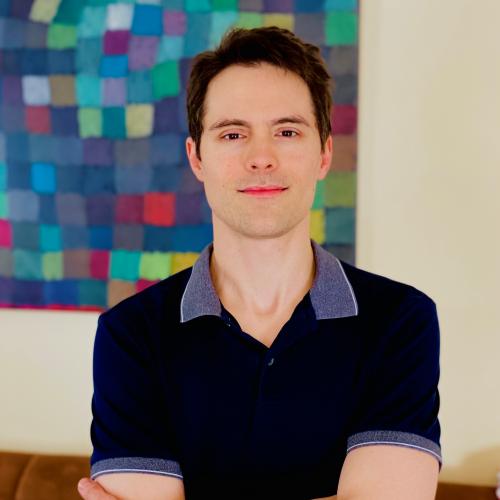
Francisco Jardim

Marcelo Ceccim

Daniel Ibri

Cristina Jorge

Ricardo Negri

Josue Caride

Daniel Hato

John McIntosh
For his PhD, John studied in Eric Schmidt’s laboratory at the University of Utah, where he studied the biosynthesis of the cyanobactin family of cyclic peptide natural products.
After finishing graduate school John was a postdoc in Frances Arnold’s laboratory at Caltech where he studied non-natural reactions of cytochrome P450s and other heme proteins.
John have been with Merck’s Small-Molecule Process Research and Development Department since 2015 where he has worked in the Biocatalysis and Protein Engineering groups. He is presently an associate principal scientist.

Alex Mira (VIRTUAL)
Alex Mira obtained an honour distinction for his BSc in Biology at the University of Alicante, Spain, in 1994. He then obtained a British Council scholarship to do a Master of Science degree at Oxford University (UK) and was the first Spanish student to be awarded a Rhodes scholarship, which allowed him to do his doctorate at Oxford on bacterial genetics, which he finished in 1999.
He then was awarded a Fulbright scholarship to carry out post-doctoral research in the USA in the field of bacterial genomics for 2 and a half years, and a second post-doc at Uppsala University (Sweden) working on microarray technology and bioinformatics.
After 9 years abroad, he returned to Spain with the Ramón y Cajal repatriation program in 2003 and initiated his own research group working on the genomics and metagenomics of oral bacteria.
In 2009, he was awarded the “Jaime Ferran” National Award for Research in Microbiology and he is currently the principal investigator of the Oral Microbiome Laboratory at the CSISP, in Spain, where he has applied metagenomics and next-generation sequencing technology to the study of dental caries, discovering the presence of bacteria which prevent the formation of cavities, as well as to the study of bacteria from breast milk, saliva, and the respiratory tract.

Dr. Robert Burne (VIRTUAL)
Robert A. Burne earned his Bachelor of Science in Microbiology from the Pennsylvania State University and his Ph.D. in Microbiology and Immunology from the University of Rochester (UR).
After a 3-year postdoctoral fellowship, he served for 10 years on the faculty of UR’s School of Medicine and Dentistry. He moved to the University of Florida College of Dentistry (UFCD) in 2001, where he served as Chair of the Department of Oral Biology for 18 years and as Program Director of UFCD’s NIDCR-funded Comprehensive Training Program in Oral Biology for over 12 years.
He is presently a Distinguished Professor of the Department of Oral Biology, after stepping down from his 10-year role as the Associate Dean for Research in 2020, and the Louis and Marge Atkins Endowed Professor.
Dr. Burne’s research is aimed at dissecting molecular mechanisms governing the ability of bacteria that colonize the human oral cavity to modulate gene expression in response to environmental inputs.
He is internationally recognized for his work with Streptococcus mutans and other oral streptococci; making seminal contributions to understanding the regulation of carbohydrate metabolism, stress tolerance, and intercellular communication by oral streptococci.
He has published ~200 peer-reviewed articles on these topics, as well as on the genetics, physiology, and ecology of oral biofilms, and on novel probiotic mechanisms used by beneficial bacteria to promote health in the oral microbiome.
Over 150 students, postdoctoral fellows, clinician-scientists, and international fellows have received training in his laboratory. He received the IADR Gies and IADR Hatton Awards as a Ph.D. student and the IADR’s Distinguished Scientist Award for Research in Dental Caries in 2009. Dr. Burne is currently a Fellow and Member-at-Large of the AAAS.